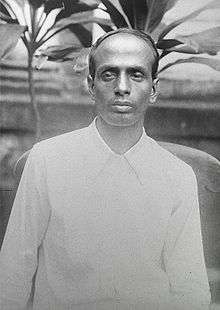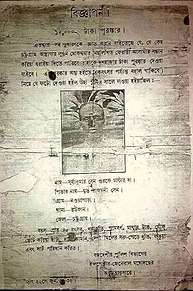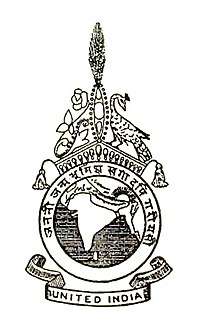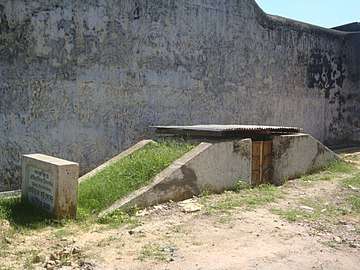Surya Sen
Surya Sen, also called Surjya Sen (22 March 1894 – 12 January 1934) was an Indian revolutionary who was influential in the Indian independence movement against British rule in India and is best known for leading the 1930 Chittagong armoury raid.
Master Da Surya Sen | |
|---|---|
সূর্য সেন (Surjo Sen) | |
 Sen | |
| Born | Surya Kumar Sen 22 March 1894 |
| Died | 12 January 1934 (aged 40) Chittagong, Bengal Presidency, British India |
| Nationality | British Raj |
| Organization | Indian National Congress Anushilan Samiti |
| Known for | Chittagong armoury raid |
| Movement | Indian Independence movement |
Sen was a school teacher by profession and was popularly known as Master Da ("da" is an honorific suffix in Bengali language). He was influenced by the nationalist ideals in 1916 while he was a student of B.A. in Behrampore College.[1] In 1918, he was selected as president of the Indian National Congress's Chittagong branch.[2]
Sen was known for recruiting a group of young and passionate revolutionaries known as the Chittagong group including Anant Singh, Ganesh Ghosh and Lokenath Bal, who fought against the British stationed in Chittagong.[3]
He was an active participant in the Non-co-operation movement and was later arrested and imprisoned for 2 years from 1926 to 1928 for his revolutionary activities. A brilliant and inspirational organiser, Sen was fond of saying "Humanism is a special virtue of the revolutionary."[3]
After the Chittagong raid in 1930 and a fierce battle where over 80 British troops and 12 revolutionaries were killed, Sen and other surviving revolutionaries dispersed into small groups and hid in neighbouring villages, launching raids on government personnel and property. Sen was arrested on 16 April 1933, tried and was hanged on 12 January 1934. Many of his fellow revolutionaries were also caught and sentenced to long periods of imprisonment.[3]
Early life

Sen was born on 22 March 1894[4] at Noapara, under Raozan Upazila in Chittagong. His father Ramaniranjan Sen was a teacher. In 1916, when he was a B.A. student in Berhampore College(Now Krishnath College) he learned about Indian freedom movement from one of his teachers. He felt attracted towards revolutionary ideals and joined the revolutionary organisation Anushilan Samity. After completing his studies he returned to Chittagong in 1918 and became a Mathematics teacher at National school, Nandankanan. At that time, Indian National Congress was the most prominent political party there.
Chittagong armoury raid
Sen led a group of revolutionaries on 18 April 1930 to raid the armoury of police and auxiliary forces from the Chittagong armoury.[5] The plan was elaborate and included seizing of arms from the armoury as well as destruction of communication system of the city (including telephone, telegraph and railway), thereby isolating Chittagong from the rest of British Raj.[5] However, although the group gained the arms, they failed to capture the ammunition. They hoisted the Indian National Flag on the premises of the armoury, and then escaped. A few days later, a large fraction of the revolutionary group was cornered in the nearby Jalalabad Hills by the British troops. In the ensuing fight, twelve Revolutionaries died, many were arrested, while some managed to flee, including Sen.[5]
Arrest and death
Sen stayed in hiding, and kept moving from one place to another. Sometimes he took up a job as a workman, a farmer, a priest, a house worker or even hid as a pious Muslim. This is how he avoided being captured by the British.
He hid in the house of a man called Netra Sen. But Netra Sen informed the British of his hiding place, and the police came and captured him in February 1933. Before Netra Sen could be rewarded by the British, a revolutionary came into his house and beheaded him with da (a long knife). As Netra Sen's wife was a big supporter of Surya Sen, she never disclosed the name of the revolutionary who killed Netra Sen. Another revolutionary named Tarakeswar Dastidar was also hanged together with Sen, after being brutally tortured by the British. His hands, legs were broken by torture. He was beaten up so cruelly, his nails were plucked off. British enjoyed he bleeds till his last breath.
His last letter was written to his friends and said: "Death is knocking at my door. My mind is flying away towards eternity. At such a pleasant, at such a grave, at such a solemn moment, what shall I leave behind you? Only one thing, that is my dream, a golden dream – the dream of free India. Never forget the date, 18th of April, 1930, the day of the eastern Rebellion in Chittagong. Write in red letters in the core of your hearts the names of the patriots who have sacrificed their lives at the altar of India’s freedom."
In popular media
Indian film director Ashutosh Gowariker directed the film Khelein Hum Jee Jaan Sey (2010) about Sen's life. Actor Abhishek Bachchan played the role of Sen.[6] Another film Chittagong (2012) directed by Bedabrata Pain was about Sen's armoury raid. Manoj Bajpayee played the leading role.[7]
See also
- Pritilata Waddedar, Bengali revolutionary nationalist
- Masterda Surya Sen metro station, metro railway station in Kolkata, India
References
- Islam, Asiatic Society of Bangladesh. Chief ed. Sirajul (2003). "Mastarda" Surya Sen (1. publ. ed.). Dhaka: Asiatic Society of Bangladesh. ISBN 9843205766. Retrieved 28 June 2015.
- Chakrabarti, Bidyut (1990). Subhas Chandra Bose and Middle Class Radicalism: A Study in Indian Nationalism, 1928-1940. I. B. Tauris & Co. Ltd. p. 108. ISBN 1850431493.
- Chandra, Bipan (1988). India's struggle for independence 1857-1947. Penguin. ISBN 9788184751833. OCLC 983835276.
- Kumar, Vijay (2008). हर दिन पावन. लोकहित प्रकाशन. ISBN 9788189606350.
- Chandra, Bipan (1989). India's Struggle for Independence: 1857-1947. Penguin Books India. pp. 251–252. ISBN 978-0-14-010781-4.
- "Ashutosh Gowariker's Khelein Hum Jee Jaan Sey to be released on December 3". Daily News & Analysis. 22 April 2010. Retrieved 11 October 2011.
- "'Chittagong': Manoj Bajpayee took no money for the film". The Times of India. 28 September 2012. Retrieved 28 September 2012.

